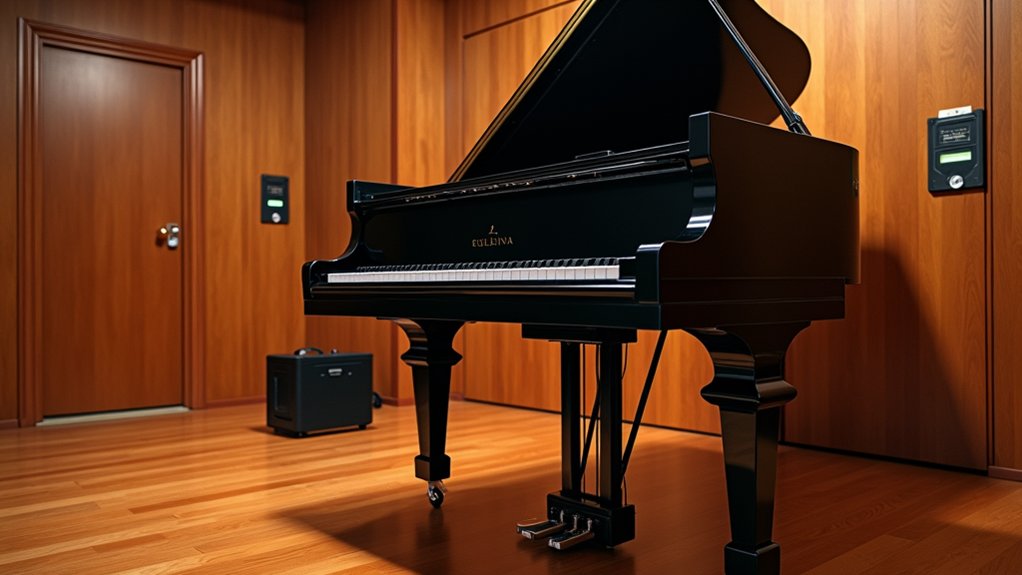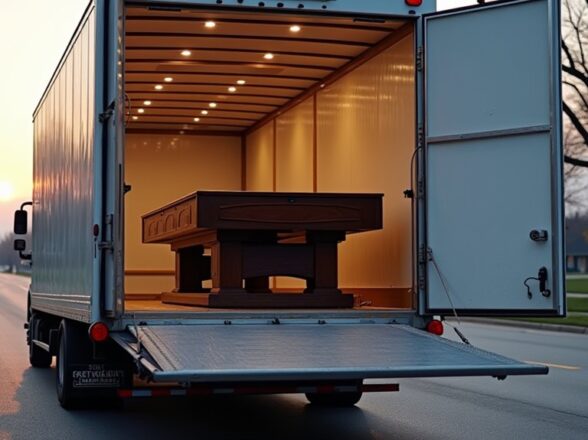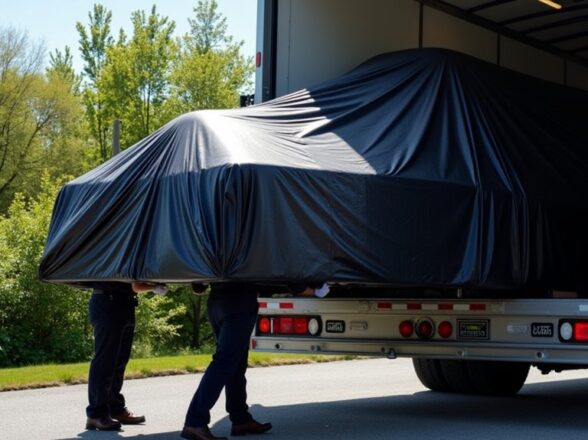What Are the Best Piano Storage Options After Moving? Secure, Climate-Controlled Solutions Explained

To keep your piano safe after moving, choose a secure, climate-controlled storage facility. Look for options that offer humidity regulation and temperature control to protect your instrument from damage. Specialized piano storage facilities provide ideal conditions and often include advanced security features like surveillance cameras and access control. Self-storage units can also be viable, but make certain they have climate control. Prepare your piano by cleaning it, checking functionality, and loosening tuning pins before storage. Consider costs and insurance for added protection. Understanding all these factors is important for maintaining your piano's integrity during storage.
Key Takeaways
- Climate-Controlled Facilities: Opt for storage that maintains stable temperature and humidity levels to prevent damage to your piano.
- Specialized Piano Storage: Choose facilities designed specifically for pianos, ensuring optimal conditions for preservation.
- Advanced Security Features: Look for storage options with surveillance cameras, access control, and on-site personnel to protect your investment.
- Self-Storage Units: Consider flexible self-storage options that offer 24/7 access, but ensure they have climate control for piano safety.
- Insurance Coverage: Factor in insurance costs to cover potential damages or losses during storage, adding peace of mind.
Understanding Piano Storage Needs

When you think about storing your piano, what factors come to mind? First, consider the duration of storage. Are you keeping it for a few weeks, months, or longer? This affects the type of maintenance your piano will need. Regular piano maintenance is vital, especially if it's stored for an extended period. You should tune it before storage and check for any necessary repairs. Additionally, think about the environment. A stable climate protects your piano from humidity and temperature changes that can cause damage. Evaluating your storage duration and maintaining the piano properly will guarantee it remains in good condition. Taking these steps will help you protect your investment and keep your piano ready for future use. Consider using climate-controlled trucks during the moving process to further ensure that your piano is protected from temperature extremes and humidity.
Types of Storage Facilities
When considering piano storage, you'll find two main types of facilities: self-storage units and climate-controlled options. Self-storage units offer flexibility and accessibility, allowing you to manage your piano's location easily. On the other hand, climate-controlled facilities provide a stable environment that protects your instrument from temperature and humidity fluctuations. For those located in Dubai, Upsleeve Storage Solutions offer climate-controlled units specifically designed to maintain optimal conditions for sensitive items, ensuring the safety and integrity of your piano.
Self-Storage Units
If you're considering a safe place for your piano, self-storage units offer a variety of options tailored to your needs. One of the self-storage advantages is flexibility; you can choose the size and type of unit that fits your piano perfectly. Also, many facilities provide 24/7 access, allowing you to retrieve your instrument whenever you need it. However, self-storage limitations include varying security measures and potential exposure to temperature fluctuations. It's essential to choose a facility that prioritizes safety and guarantees your piano stays protected. You'll want to inspect the unit beforehand, looking for cleanliness and proper maintenance. Overall, self-storage can be a practical solution, as long as you weigh the benefits against the limitations. To ensure the best protection for your piano, consider opting for climate-controlled options that safeguard against damage from temperature changes.
Climate-Controlled Facilities
For piano owners seeking extra protection, climate-controlled facilities stand out as an excellent choice. These facilities maintain a stable environment, which is essential for preserving the integrity of your instrument. Fluctuations in temperature and humidity can damage your piano over time. By using climate control, you guarantee your piano is safe from such risks. When selecting a climate-controlled facility, consider the storage duration. Whether you need short-term or long-term storage, these facilities can accommodate your needs. They often provide 24/7 access, allowing you to check on your piano whenever you want. Overall, climate-controlled storage offers peace of mind, knowing your piano is in a secure and stable environment while you can't be with it. Additionally, advanced security measures such as CCTV surveillance and biometric access control are often employed to ensure the safety of your valuable instrument.
Benefits of Climate-Controlled Storage

When storing your piano, climate-controlled storage offers essential benefits. It helps regulate temperature, preventing damage from extreme heat or cold. Additionally, controlling humidity levels protects your piano from warping or cracking, ensuring it stays in top condition.
Temperature Regulation Importance
While you might think any storage space can suffice for your piano, temperature regulation plays a crucial role in preserving its integrity. Pianos are sensitive to temperature fluctuations, which can cause wood to expand or contract. This can lead to warping and affect the instrument's sound quality. In addition, extreme temperatures can impact glue joints and other components, leading to potential damage. A climate-controlled storage unit maintains consistent temperatures, protecting your piano from these harmful changes. By ensuring stable conditions, you help prevent deterioration and keep your piano in ideal playing condition. Investing in a climate-controlled option is essential for safeguarding your instrument's longevity and performance, allowing you to enjoy it for years to come.
Humidity Control Benefits
Along with temperature control, managing humidity is essential for your piano's well-being. Proper humidity regulation helps maintain the integrity of the wood and prevents damage from moisture fluctuations. High humidity can cause wood to swell, while low humidity can lead to cracks. Climate-controlled storage provides moisture control, ensuring a stable environment.
Here's a quick comparison of humidity levels and their effects:
| Humidity Level | Impact on Piano |
|---|---|
| Below 30% | Wood may crack |
| 30%-50% | Ideal for most pianos |
| 50%-70% | Can cause swelling |
| Above 70% | Risk of mold growth |
Security Features to Look For
As you consider piano storage options, it's crucial to look for essential security features that protect your instrument from theft and damage. First, check for advanced security technology like surveillance cameras and alarm systems. These can deter potential thieves and provide peace of mind. Additionally, inquire about access control measures. Secure facilities typically have restricted access, meaning only authorized personnel can enter. Look for keycard systems or biometric scanners to guarantee your piano is safe from unauthorized entry. Also, consider the overall location of the storage facility. A well-lit area with a good reputation can further enhance security. Taking these precautions will help guarantee your piano remains in excellent condition while stored away.
Preparing Your Piano for Storage

Preparing your piano for storage is essential to guarantee it remains in top condition. Start by cleaning the piano with a soft cloth to remove dust and debris. Ascertain all keys are functioning properly and that there's no moisture inside. Use piano maintenance tips like regulating humidity levels to prevent damage. If possible, loosen the tuning pins slightly to relieve tension on the strings. Secure the piano with moving blankets or bubble wrap to protect it during transport. When moving, use precautions like hiring professional movers experienced in handling pianos. Finally, store the piano in a climate-controlled facility to avoid extreme temperatures and humidity. These steps will help your piano stay safe and sound while in storage.
Tips for Choosing the Right Facility
Once your piano is ready for storage, selecting the right facility becomes a priority. Start by considering the facility location. It should be convenient for you to access, especially if you plan to check on your piano regularly. Look for a facility that offers climate-controlled units, as temperature and humidity can damage your instrument. Next, evaluate the storage costs. Compare prices among various facilities to find one that fits your budget while still providing the necessary features. Don't forget to read reviews or ask for recommendations to guarantee the facility has a good reputation. Finally, confirm that the facility has security measures in place, like surveillance cameras, to protect your piano from theft or damage.
Frequently Asked Questions
How Much Does Piano Storage Typically Cost?
Piano storage costs can vary, depending on storage facility options you choose. Typically, expect to pay between $50 to $300 monthly. Make sure to compare prices and services to find the best fit for your needs.
Can I Store My Piano With Other Items?
You can store your piano with other items, but it's essential to choose the right storage solutions. Make certain the environment is stable and secure to protect your piano from damage caused by temperature fluctuations or moisture.
What Is the Ideal Humidity Level for Piano Storage?
Think of your piano as a delicate flower. To thrive, it needs humidity control between 40-60%. This balance guarantees proper piano maintenance, preventing warping and cracking, so your instrument blooms beautifully for years to come.
How Long Can I Store My Piano Safely?
You can safely store your piano for several months, but for long-term storage, follow piano maintenance tips. Guarantee it's kept in a stable environment to prevent damage and maintain its sound quality over time.
Will My Piano Insurance Cover Storage Damage?
Did you know that 30% of pianos suffer damage in poor storage conditions? Check your insurance coverage details; some policies might cover storage damage, but only if the conditions meet specific standards. Always clarify with your provider.
Conclusion
In conclusion, finding the right piano storage after a move is essential for your instrument's well-being. Climate-controlled facilities protect against temperature and humidity changes, while security features guarantee your piano stays safe. By preparing your piano properly and carefully selecting a facility, you can keep your investment in top shape. Just like a well-tuned piano, the right storage solution strikes the perfect chord between safety and care. Make informed choices to safeguard your musical instrument.
Related posts
Recent posts
Post Categories
Tags
Subscribe





